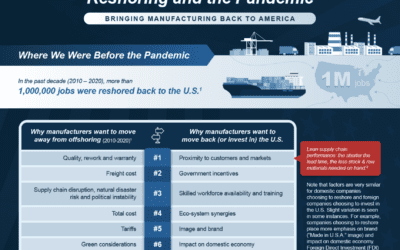This is a guest blog post created by Kim, a Partnership Coordinator with NIST MEP’s Regional and State Partnership Division.
The National Institute of Standards and Technology’s Manufacturing Extension Partnership (NIST MEP) is, as you might expect from the name, always looking for more and better ways to work with manufacturers across the U.S. The MEP National Network™, whose mission is to strengthen and empower U.S. manufacturers, comprises the NIST MEP, the 51 MEP Centers located in all 50 states and Puerto Rico, the MEP Advisory Board, MEP Center boards and the Foundation for Manufacturing Excellence, as well as more than 1,400 trusted advisors and experts at approximately 450 MEP service locations. The Network is always open to new opportunities and unique partnerships — we are very extroverted that way.
One such opportunity comes in the form of programs and projects involving the National Aeronautics and Space Administration (NASA). Through various efforts, NASA has been involved with manufacturing in ways that may surprise you. From students using NASA-patented materials as the basis of new product ideas to addressing companies’ additive manufacturing challenges, NASA has inspired future and current manufacturers across the country.
Innovation-led development is a key driver of economic growth, high-quality jobs and rising standards of living. To be successful, a high-functioning innovative ecosystem must be able to translate research and development activities into products and move technology commercialization into manufacturing companies. It is well known that federal labs play a key role in the generation of new ideas that lead to the discovery and development of new technologies — innovations that enable scientific advancements and impact the economy. NASA’s patent portfolio includes more than 1,200 inventions available for commercial use, many of which could solve industry technical challenges.
NASA is leading the way to address these challenges by shifting its organizational culture toward dedicated advocacy for entrepreneurship and developing novel approaches for external engagement. One of the ways NASA is approaching technology advocacy is through a formal partnership with NIST MEP. Through this collaboration NASA and NIST MEP will share information, host a series of informational webinars with a manufacturing focus, and connect the MEP National Network with additional resources.
Manufacturing Program and Project Collaborations with NASA
Technology Transfer Expansion (T2X) Program
At NASA, one outcome of this collaboration has been the creation of the Technology Transfer Expansion (T2X) program. With a vision for NASA-infused tech startup ecosystems across the U.S., T2X accelerates commercialization of NASA innovations through partnerships and pipeline development, entrepreneurial workforce training and engagement efforts within communities of future founders.
In the hands of visionaries and pioneers, federal lab innovations have and can change the world. Novel approaches to commercialization and ecosystem engagement are being implemented across the government, and the outlook for impactful results from this program is promising.
Utah State University’s Outdoor Product Design & Development Degree
The University of Utah Manufacturing Extension Partnership (UUMEP) Center, part of the MEP National Network, brings together some of the strongest manufacturing improvement groups in Utah combined with university resources, government relationships and economic development partnerships to provide manufacturers excellent training, consulting and customer service. Each partner brings a unique set of offerings to improve manufacturing in Utah.
One of those partners, Utah State University (USU), is offering a bachelor’s degree in Outdoor Product Design & Development (OPDD). The OPDD program prepares students for careers in bringing innovative, sustainable and impactful products to market in the dynamic sports, outdoor and active industries. This new program brings together industrial design, engineering, digital design, fashion, sustainability, business, supply chain management and many other concepts important in the creation of consumer products. Students can choose design, development or product line management for specialization after completing the first two years on foundations.
For one class in USU’s OPDD program, students conceptualized ways to incorporate NASA-patented materials and tech into potential products for the outdoor industry. Students had the chance to talk with some of the inventors, sketch, design, conduct user research on product ideas, and deliver their final presentations to NASA for feedback. You can watch the video to learn more about the presentations.
NASA’s TechConnect
In 2018, Product Evaluation Systems (PES), a client of Catalyst Connection (part of the Pennsylvania MEP and the MEP National Network) participated in a NASA TechConnect event held at America Makes, the Manufacturing USA® institute for additive manufacturing in Youngstown, Ohio. The TechConnect event was jointly sponsored by the NASA Glenn Research Center, MAGNET (part of the Ohio MEP), Catalyst Connection and America Makes. TechConnect offered regional manufacturers the opportunity to receive one-on-one assistance from NASA experts to help solve their additive manufacturing challenges.
Companies were asked to submit a technical challenge statement as part of the application process. NASA subject matter experts were identified to help the companies solve their specific technical issues. Three months after meeting with NASA experts at the TechConnect event, PES visited the NASA Glenn Research Center and saw firsthand the equipment that NASA uses to characterize powders and test parts produced via additive manufacturing. From its discussions with NASA experts, PES was able to develop matrices for minimum and recommended testing plans based on various technology readiness levels. PES also learned about specific additive manufacturing equipment that will enable the company to expand its capabilities for characterizing metal powders.
According to Jerry Capo, Technical Director – Metallurgy, at PES, “TechConnect was an excellent opportunity to interact with NASA subject matter experts who have deep knowledge of additive manufacturing. Their willingness to listen to small companies like PES and help us with our specific challenges was invaluable. I wish there were more opportunities like this.”
“The opportunity to meet with NASA’s experts easily saved us 12 to 24 months in development time,” Capo adds. “The opportunity to participate in TechConnect substantially shortened our additive manufacturing learning curve. This helps not only our company but also benefits those companies that look to PES for guidance as they move through their own additive manufacturing learning curve.”
Learn More
Collaborations between NASA, the MEP National Network and other organizations are beneficial to advancing manufacturing and providing innovative solutions to daily challenges manufacturers face. To learn more about these and other programs and projects, reach out to Samantha Kilgore.



